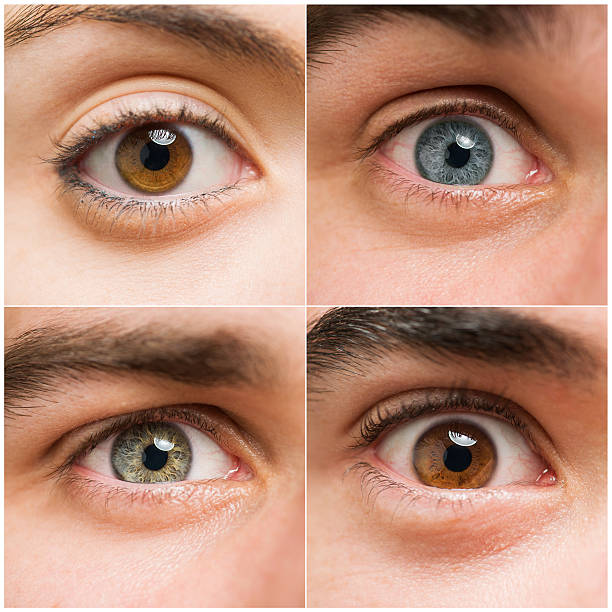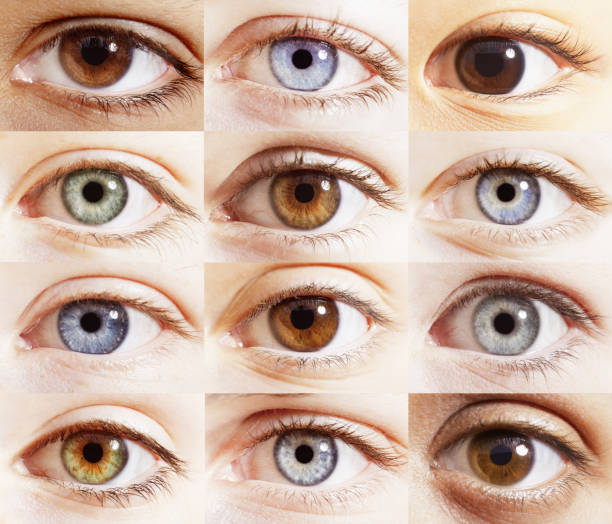Il tuo carrello è vuoto
What Does It Mean to Look Deeply Into Your Own Eyes in the Mirror?

Looking deeply into your own eyes in the mirror can be a profound and transformative experience. It allows you to connect with your inner self, gain greater self-awareness, and embark on a journey of personal growth. In this article, we'll explore the psychological and emotional implications of this practice and provide guidance on how to effectively incorporate it into your daily life.
The Concept of Self-Reflection
Self-reflection is a powerful tool for personal development and growth. It involves taking a step back to evaluate your thoughts, emotions, and actions objectively. Looking deeply into your own eyes in the mirror serves as a profound method for this introspection, allowing you to connect with your inner self on a deeper level.
When you gaze into your own eyes, you are confronting your true self, with all your strengths, weaknesses, and hidden aspects. This practice can help you recognize patterns in your behavior and thoughts that you may not have been aware of before, leading to greater self-understanding and personal insights.
Self-reflection can take various forms, such as:
-
Journaling: Writing down your thoughts, feelings, and experiences can help you process and understand them better, providing clarity and perspective.
-
Meditation: This practice allows you to quiet your mind, focus inward, and observe your thoughts and emotions without judgment, fostering a deeper connection with your inner self.
-
Therapy: Talking to a professional therapist can provide valuable insights into your behavior, emotions, and thought patterns, helping you gain a clearer understanding of yourself and work through any challenges you may face.
By engaging in regular self-reflection, you can cultivate a greater sense of self-awareness, which is essential for personal growth and development.
The Psychological Impact
The act of gazing into your own eyes can have a profound psychological impact. It can influence your mental state, emotions, and overall well-being. When you look deeply into your own eyes, you may experience a range of psychological responses, such as:
-
Increased Self-Awareness: By focusing on your own reflection, you become more attuned to your thoughts, feelings, and inner experiences, leading to a heightened sense of self-awareness.
-
Emotional Release: The process of self-gazing can trigger the release of pent-up emotions, such as sadness, anger, or joy, allowing you to acknowledge and process these feelings in a healthy manner.
-
Clarity and Insight: As you observe your own eyes, you may gain new insights into your thoughts, motivations, and behaviors, leading to greater clarity and understanding of yourself.
Research has shown that regular self-reflection can have a positive impact on mental health. A study published in the Journal of Personality and Social Psychology found that individuals who engaged in self-reflection experienced lower levels of stress, anxiety, and depression, as well as increased self-esteem and overall well-being.
By embracing the psychological benefits of self-gazing, you can cultivate a more positive and resilient mindset, better equipped to navigate life's challenges and pursue personal growth.
Emotional Reactions and Their Meanings
When you look deeply into your own eyes, you may experience a wide range of emotional reactions. These emotions can provide valuable insights into your inner self and help you understand your true feelings. Some common emotional reactions and their potential meanings include:
-
Sadness: Feeling a sense of sadness or melancholy may indicate unresolved issues, past traumas, or a need for emotional healing and self-compassion.
-
Happiness: Experiencing joy or contentment while gazing into your eyes can signify a deep sense of self-acceptance, inner peace, and alignment with your authentic self.
-
Anger: Feelings of anger or frustration may point to underlying conflicts, unmet needs, or a desire for change and assertiveness in certain areas of your life.
By analyzing and interpreting these emotional reactions, you can gain a deeper understanding of your inner landscape and work towards addressing any issues or imbalances. For example, if you consistently feel sadness during self-gazing, it may be an invitation to explore the root causes of this emotion, seek support, and engage in self-care practices that promote healing and emotional well-being.
Remember that emotional reactions are unique to each individual, and there is no right or wrong way to feel. The key is to approach your emotions with curiosity, compassion, and a willingness to learn from them.
Techniques for Effective Self-Gazing
To make the most out of your self-gazing practice, it's important to approach it with intention and use effective techniques. Here are some step-by-step instructions and tips to enhance your experience and derive meaningful insights:
-
Create a Conducive Environment: Find a quiet, private space where you won't be disturbed. Ensure that the lighting is soft and comfortable, and that you have a clear, unobstructed view of your reflection in the mirror.
-
Set an Intention: Before beginning, take a moment to set a clear intention for your self-gazing practice. This could be a specific question you want to explore, an emotion you want to process, or a general openness to self-discovery.
-
Relax and Center Yourself: Take a few deep breaths to calm your mind and body. Allow yourself to relax and release any tension or distractions, bringing your focus inward.
-
Gaze Softly into Your Eyes: Look deeply into your own eyes, maintaining a soft, gentle gaze. Avoid staring intensely or critically; instead, approach your reflection with curiosity and compassion.
-
Observe Your Thoughts and Emotions: As you gaze into your eyes, notice any thoughts, feelings, or sensations that arise. Allow them to come and go without judgment, simply observing and acknowledging their presence.
-
Reflect and Integrate: After your self-gazing session, take some time to reflect on your experience. Journal about any insights, emotions, or realizations that emerged, and consider how you can integrate this newfound self-awareness into your daily life.
To enhance your self-gazing practice, consider the following tips:
-
Start Small: If you're new to self-gazing, begin with short sessions of a few minutes and gradually increase the duration as you become more comfortable.
-
Practice Regularly: Consistency is key to reaping the benefits of self-gazing. Aim to incorporate this practice into your daily routine, even if it's just for a few minutes each day.
-
Embrace Discomfort: It's normal to feel uncomfortable or self-conscious when first starting out. Acknowledge these feelings with compassion and remind yourself that discomfort is often a sign of growth and expansion.
By approaching self-gazing with patience, openness, and a willingness to learn, you can unlock the transformative power of this practice and gain valuable insights into your inner world.
Benefits of Regular Self-Reflection
Incorporating self-reflection into your daily routine can lead to numerous benefits for your personal growth and well-being. Some of the key benefits of regular self-reflection include:
-
Enhanced Self-Awareness: By consistently engaging in self-reflection, you develop a deeper understanding of your thoughts, emotions, and behaviors. This heightened self-awareness allows you to make more conscious choices and align your actions with your values and goals.
-
Improved Emotional Intelligence: Self-reflection helps you become more attuned to your own emotions and those of others. By regularly processing and understanding your feelings, you can develop greater emotional intelligence, leading to better communication, relationships, and overall well-being.
-
Increased Resilience: Through self-reflection, you can identify your strengths, weaknesses, and areas for growth. This self-knowledge empowers you to navigate challenges more effectively, bounce back from setbacks, and cultivate a more resilient mindset.
-
Clarity and Direction: Taking time to reflect on your experiences, values, and aspirations can provide clarity and direction in your life. By gaining a clearer sense of who you are and what you want, you can make more purposeful decisions and take steps towards creating a fulfilling and meaningful life.
For example, a study published in the Journal of Clinical Psychology found that individuals who engaged in regular self-reflection experienced significant improvements in self-esteem, emotional well-being, and overall life satisfaction. By making self-reflection a consistent part of your routine, you can tap into these powerful benefits and support your personal growth journey.
Challenges and How to Overcome Them
While self-gazing can be a transformative practice, it's not without its challenges. Here are some common obstacles you may face and strategies to overcome them:
-
Discomfort and Self-Consciousness: Looking deeply into your own eyes can feel uncomfortable or awkward, especially if you're not used to this level of self-confrontation. To overcome this, start with short sessions and gradually increase the duration as you build comfort and confidence. Remind yourself that discomfort is a natural part of growth and that it will become easier with practice.
-
Negative Self-Talk and Judgment: When gazing into your own eyes, you may encounter negative self-talk or critical thoughts about yourself. It's important to approach these thoughts with compassion and curiosity rather than judgment. Acknowledge them as passing mental events rather than truths, and gently redirect your focus back to your reflection.
-
Distractions and Restlessness: It's common to experience distractions or a sense of restlessness during self-gazing, especially if you have a busy mind. To counteract this, try incorporating deep breathing or a simple mantra to anchor your attention. If your mind wanders, simply notice it without judgment and gently guide your focus back to your eyes.
-
Emotional Intensity: Self-gazing can sometimes bring up intense emotions, such as sadness, anger, or fear. If this happens, remember that it's a natural part of the process and that these emotions are surfacing for a reason. Allow yourself to feel them fully, and if needed, seek support from a trusted friend, family member, or therapist to help you process and integrate these experiences.
By approaching these challenges with patience, self-compassion, and a willingness to learn, you can navigate them more effectively and deepen your self-gazing practice over time.
Incorporating Self-Gazing into Daily Life
To fully harness the benefits of self-gazing, it's important to make it a consistent part of your daily routine. Here are some tips and suggestions for seamlessly integrating this practice into your life:
-
Set a Regular Time: Choose a specific time each day to engage in self-gazing, such as first thing in the morning or before bed. This helps create a habit and ensures that you prioritize this practice amidst your other daily commitments.
-
Create a Dedicated Space: Designate a specific place in your home for self-gazing, such as a quiet corner of your bedroom or a peaceful spot in your living room. Having a dedicated space can help you associate that area with introspection and self-reflection, making it easier to drop into the practice.
-
Combine with Other Practices: Integrate self-gazing with other supportive practices, such as journaling, meditation, or yoga. For example, you could spend a few minutes gazing into your eyes before or after your daily meditation session, or use self-gazing as a prompt for reflective journaling.
-
Start Small and Build Gradually: If you're new to self-gazing, begin with short sessions of just a few minutes and gradually increase the duration as you become more comfortable. Consistency is more important than length, so focus on making self-gazing a regular part of your routine rather than pushing yourself to practice for extended periods right away.
-
Be Patient and Compassionate: Remember that incorporating any new habit takes time and practice. Be patient with yourself and approach self-gazing with a spirit of self-compassion and curiosity. Celebrate your commitment to this practice and trust that the benefits will unfold naturally over time.
By weaving self-gazing into the fabric of your daily life, you can create a powerful anchor for self-reflection and personal growth, supporting your ongoing journey of self-discovery and transformation.
Personal Stories and Testimonials
Hearing the experiences of others who have embraced self-gazing can be both inspiring and reassuring. Here are a few personal stories and testimonials from individuals who have found profound benefits through this practice:
-
Sarah's Story: "I started practicing self-gazing during a particularly challenging time in my life, when I was struggling with self-doubt and low self-esteem. At first, it felt uncomfortable to look deeply into my own eyes, but with time, I began to see myself with greater compassion and understanding. Self-gazing has become a daily anchor for me, helping me connect with my inner strength and wisdom, even in the midst of difficult circumstances."
-
Mark's Experience: "As someone who has always been more focused on external achievements and validation, self-gazing was a game-changer for me. It provided a space for me to turn inward and really get to know myself on a deeper level. Through this practice, I've gained clarity on my values, passions, and purpose, and have started making choices that are more aligned with my authentic self. Self-gazing has been a key tool in my personal growth journey."
-
Emily's Journey: "I first discovered self-gazing during a meditation retreat, and it quickly became a beloved practice for me. Looking into my own eyes has been a profound way to cultivate self-love and acceptance, and to release old patterns of self-criticism and judgment. It's also been a powerful mirror, reflecting back to me the beauty, strength, and resilience that I sometimes forget I possess. Self-gazing has truly been a gift in my life."
These stories illustrate the transformative potential of self-gazing and the unique ways in which this practice can support personal growth, healing, and self-discovery. By connecting with the experiences of others, you may find inspiration and validation for your own self-gazing journey.
Final Thoughts
Looking deeply into your own eyes in the mirror is a simple yet profound practice that can catalyze significant personal growth and transformation. By creating a space for self-reflection, emotional processing, and inner connection, self-gazing allows you to access a deeper understanding of yourself and cultivate greater self-awareness, compassion, and resilience.
As you embark on this journey of self-discovery, remember to approach the practice with patience, openness, and a spirit of self-compassion. The path of self-reflection is not always easy, but it is infinitely rewarding. Trust in the wisdom and guidance that emerges from within, and allow yourself to be transformed by the power of your own gaze.
By incorporating self-gazing into your daily life and committing to this practice over time, you can unlock the full potential of this transformative tool and experience profound shifts in your relationship with yourself and the world around you. May your self-gazing journey be filled with insight, healing, and the unfolding of your most authentic and luminous self.




